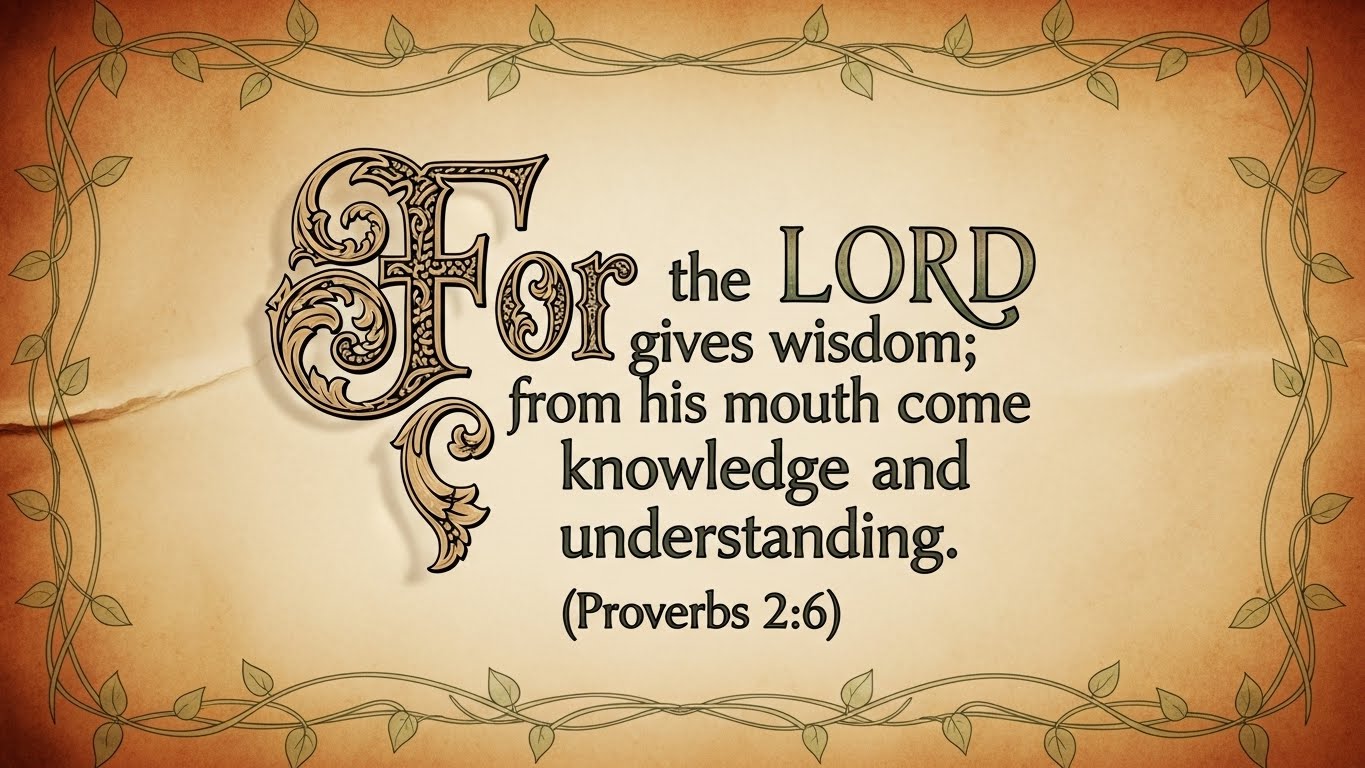Finding Wisdom In The Bible: Proverbs 2:6

Introduction
Have you ever wished you had a guide for life’s messy choices? Maybe you’re standing at a crossroads—deciding about a job, a relationship, or how to respond when someone hurts you. You’re not alone. When life asks hard questions, you instinctively reach for answers. The Bible offers those answers, and Proverbs 2:6 stands out as a short, powerful reminder: wisdom comes from God. In this article, you’ll explore what that verse means, why it matters, and how you can let wisdom from the Bible shape your decisions, your relationships, and your heart.
The Bible Foundation
Proverbs 2:6 — Verse and Context
Read the verse: Proverbs 2:6 (NIV) — “For the LORD gives wisdom; from his mouth come knowledge and understanding.”

This short sentence sits inside a longer passage where Solomon, or the wisdom tradition, invites you to pursue wisdom like treasure. The surrounding verses (Proverbs 2:1–11) explain how to seek wisdom—by listening, praying, and valuing instruction. In simple terms: wisdom isn’t something you invent; it’s something God gives when you look to Him and learn His ways. The verse points to God as the source, not human cleverness, reminding you that real insight begins with a relationship with the Lord.
Why This Matters for You
You live in a noisy world of quick fixes and confident opinions. Proverbs 2:6 re-centers you: if you want true, lasting insight for life’s decisions, you start by seeking God. That changes the goal from being “right” or “successful” in the world’s sense to being wise in God’s sight. It’s practical and hopeful—because wisdom from God helps you avoid traps and live toward flourishing.
Understanding the Core Truth
What the Verse Teaches in Plain Words
At its heart, Proverbs 2:6 teaches one clear truth: wisdom is a gift from God. When you prioritize God’s voice—through Scripture, prayer, and godly counsel—you receive knowledge (facts about how life works) and understanding (the ability to apply those facts in your heart and choices). It’s not moralizing or abstract; it’s everyday help. God’s wisdom helps you know when to speak and when to listen, how to manage finances, how to nurture relationships, and how to face suffering with perspective.
Why This Is Important for Your Life
If you accept that wisdom comes from God, then seeking wisdom also becomes a spiritual practice. You stop relying solely on your experience or the loudest voices online. Instead, you create habits—reading Scripture, asking God in prayer, seeking wise community—that shape your character and decisions. That’s how your choices become less reactive and more rooted in what truly leads to life.
Going Deeper — The Hidden Meaning

The Heart-Level Truth Behind the Verse
Beyond practical advice, Proverbs 2:6 carries a heart-level invitation: trust God as your teacher. That trust reshapes your identity. When you see God as the source of wisdom, you admit that you don’t have all the answers—and that’s okay. Admitting need is the first step toward growth. The verse quietly challenges pride and points you toward dependence on God’s revelation.
A Relatable Example
Think about Solomon asking for wisdom in 1 Kings 3. Faced with overwhelming responsibility, Solomon didn’t ask for long life or wealth; he asked for discernment to govern well. God honored that request (see 1 Kings 3:9–12). Like Solomon, when you prioritize wisdom, you get what truly sustains leadership, parenting, and relationships—clarity and moral insight that benefit others.
Modern Connection — Relevance Today
How Ancient Wisdom Speaks into Your 21st-Century Life
In an era of information overload, “knowledge” is everywhere, but “wisdom” is rare. Wisdom in the Bible helps you navigate decisions that algorithms and trending opinions can’t solve. At work, it’s the difference between cleverness and integrity; in family life, between quick fixes and long-term nurturing. Seeking wisdom means you measure choices against God’s character and biblical truth, not just what’s popular or profitable.
Examples You Face Right Now
Maybe you’re deciding whether to take a promotion that will strain family life. Biblical wisdom asks you to weigh long-term relationships and stewardship, not only short-term gain. Or maybe you’re scrolling social media and tempted to react in anger; wisdom tells you to pause, consider motives, and choose humility. In each case, Proverbs 2:6 points you back to God as the source of the right perspective.
Practical Application — Living the Message

Simple, Doable Steps to Seek Wisdom
You don’t need a dramatic life change to begin seeking wisdom. Start small:
- Read Scripture regularly—begin with Proverbs and Psalms to build practical habits.
- Pray specifically—ask God for wisdom when decisions arise (see James 1:5).
- Find a trusted friend or mentor to ask for Godly counsel.
- Pause before reacting; ask, “What would wisdom look like here?”
These steps help you cultivate a lifestyle where God’s wisdom becomes your go-to resource.
How You’ll Know It’s Working
You’ll notice changes: you’ll pause more often, you’ll choose long-term peace over short-term victory, and relationships will slowly heal because you choose humility. Wisdom doesn’t always produce immediate applause, but it produces a steady, trustworthy life.
Faith Reflection Box
Take a quiet minute. Where could you ask God for wisdom this week? Is it a conversation you’re avoiding, a financial decision, or a parenting choice? Write one area down and pray: “Lord, give me wisdom.”
Key Takeaways
- Wisdom in the Bible comes from God, not from you alone.
- Seek wisdom through Scripture, prayer, and wise counsel.
- Apply wisdom in everyday decisions by choosing long-term faithfulness over short-term gains.
Q&A
Q1: How do I know God’s wisdom and my own ideas apart from one another? Answer: Great question. You’ll often sense a difference between your immediate preferences and what reflects God’s character—love, truth, humility. God’s wisdom usually produces peace and aligns with Scripture. When you’re unsure, pray for clarity and consult faithful Christians who know Scripture. James 1:5 encourages you to ask God for wisdom: James 1:5. Also consider Proverbs 3:5-6—trusting God helps you distinguish His wisdom from your impulses. Listening and testing for fruit over time helps you discern reliably.
Related: (VOTD) Guard Your Heart — Living With Wisdom From Proverbs 4:23
Q2: If God gives wisdom, why do I still make mistakes? Answer: Receiving wisdom doesn’t make you infallible; it begins a process. Think of wisdom like a muscle—you grow it by practice. Even mature believers make mistakes because we live in a broken world and have imperfect knowledge. The Bible shows leaders who sinned despite insight (David, Peter, and others). Wisdom helps you repent, learn, and choose differently next time. Keep returning to God, use Scripture as your guide, and let community correct and restore you. Over time, wisdom changes your habits and reduces repeated errors. See Proverbs 28:26 and Psalm 119:105 for guidance.
Q3: How can I teach my kids to value God’s wisdom? Answer: Modeling matters most. Share how you seek God in decisions and bring them into age-appropriate conversations about choices. Read Proverbs together and ask questions like, “What would wisdom say here?” Pray for them and encourage questions. Give them opportunities to practice making wise choices with gentle correction. Teach that wisdom is more valuable than quick success—Proverbs 1:7 explains that the fear of the Lord is the beginning of knowledge. Make family routines—prayer before decisions, Bible time, and honest talk—so wisdom becomes a lived habit.
See also: Growing in Wisdom Through the Holy Spirit (1 Corinthians 2:12–13)
Conclusion & Reflection
Proverbs 2:6 is short but powerful: “For the LORD gives wisdom; from his mouth come knowledge and understanding.” When you lean into that truth, everyday choices gain eternal perspective. Seeking wisdom in the Bible is not about being perfect; it’s about being guided by the One who knows you best. So take one small step today—open Scripture, ask God, and listen. Over time, you’ll find your heart and choices shaped by a wisdom that leads to life.
A short prayer you can speak now: Lord, I ask for wisdom. Help me hear Your voice, trust Your guidance, and live decisions that honor You. Teach me to choose what leads to life, for the good of others and Your glory. Amen.

More Inspiration Awaits — Read These Next
👉 For deeper insight into Isaiah 40:31 and how it renews your strength in both faith and daily life
👉 For practical lessons on compassion and neighborliness from the Good Samaritan
👉 For a clear explanation of what we can learn from the Parable of the Good Samaritan
👉 For meaningful insights from the Parable of the Pearl and its hidden treasures
👉 For a deeper look at the Rich Man and Lazarus and what it reveals about the afterlife
👉 For guidance on the Parable of the Ten Virgins and preparing for God’s Kingdom
👉 For clarity on the Parable of the Lamp and how it calls us to shine our light
👉 For insights from the Parable of the Wedding Feast and the meaning behind the invited guests

📘 Jesus and the Woman Caught in Adultery – Grace and Mercy Over Judgement
A powerful retelling of John 8:1-11. This book brings to life the depth of forgiveness, mercy, and God’s unwavering love.
👉 Check it now on Amazon 🛒💥
🔥 “Every great message deserves a home online.” 🌍💬🏡
Don’t let your calling stay hidden. Start a Christian blog or website using Hostinger — with 99.9% uptime, a free domain, and SSL, your voice can shine for God’s glory anytime, anywhere.
💥 Begin today. 🛒 Try it RISK-FREE! ✅
✝️ “Your body is God’s temple — care for it with purpose.” 💪💖🏛️
Renew your energy and restore balance naturally. Mitolyn helps support a healthy metabolism, giving you the vitality to live out God’s calling with strength and confidence.
🔥 Unlock Your Metabolic Power! ⚡Burn More Calories & Feel Great With Mitolyn. 💪
👉 Start Today. 🚀 Check Price Now. 🛒💰
💰 As a ClickBank & Amazon Affiliate, I earn from qualifying purchases.
📖 Acknowledgment: All Bible verses referenced in this article were accessed via Bible Gateway (or Bible Hub).
🚀 Want to explore more? 👉 Dive into our new post on Why Jesus? and experience the 🔥 life-changing truth of the Gospel!








